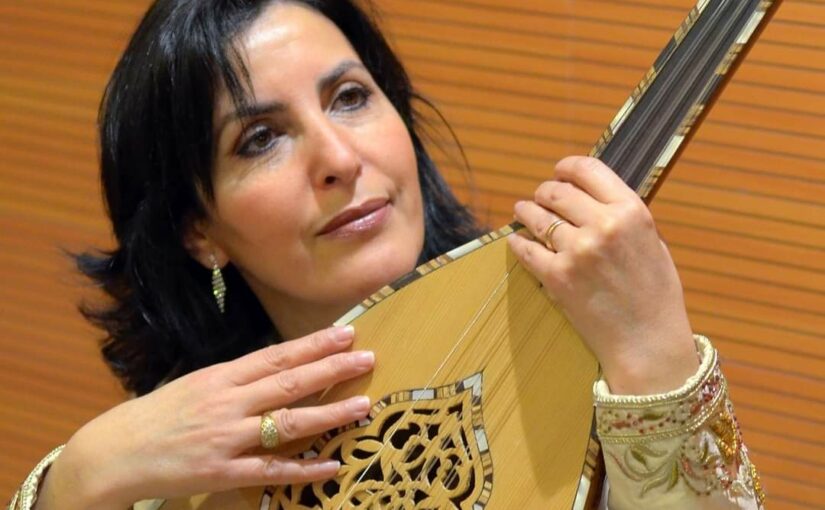OBJECTIVES
Beihdja RAHAL invites you to immerse yourself in the repertoire of the Nouba, an integral part of Algerian musical heritage, and specifically in the music of çanaâ. This training serves as an introduction to Arabo-Andalusian music, whose origins date back to the fall of Granada and the subsequent settlement of Arabs across North Africa. This legacy gave rise to three major musical schools in the Maghreb: the Constantine School (Malouf), the Tlemcen School (Gharnati), and the Algiers School (çanaâ).
GENERAL CONTENT
- History and Heritage: Exploration of the historical roots of Arabo-Andalusian music and its development across different regions of Algeria.
- Structure of the Nouba: Introduction to the musical suite of the Nouba, which is composed of five movements progressing from the slowest to the fastest : Mceddar / Btaïhi / Derdj / Insiraf / Khlass
- Sung Texts: Study of poetic texts sung in classical Arabic (Mouwachah) and occasionally in spoken Arabic of the period (Zadjel).
- Modality and Improvisation: Discovery of the musical modes used in çanaâ, a modal genre where interpretation and improvisation play a central role.
- Expanded Repertoire: Analysis of the Nouba, the inqilabate, as well as elements of popular and religious music that enrich the Algerian musical tradition.
- Interpretation and Preservation: Reflection on the challenges of preserving this music, which is marked by transmission methods that are sometimes precarious, but also by underexplored elements of genius, offering a vast field for artistic exploration.
This training allows participants to discover and immerse themselves in the subtle art of çanaâ music, a genre that represents one of the key treasures of Algeria’s cultural heritage, where tradition and interpretation beautifully intertwine.
REGISTER NOW
>> ON-LINE REGISTRATION <<
>> RATES AND REGISTRATION PROCEDURE <<
BIOGRAPHY
Rarely has an interpreter of the Andalusian repertoire, also mastering the Aroubi and Hawzi styles, demonstrated such passion in the practice of their art. Yet initially, Beihdja Rahal, born in Algiers, did not envision a career in music. In 1974, her mother enrolled her, along with her siblings, at the conservatory. While some chose the piano as their instrument, since there was one at home, Beihdja opted for the mandolin for practical reasons. At the conservatory, she chose Andalusian music as her discipline and studied under masters such as Abderrezak Fakhardji, Mohamed Khaznadji, and Zoubir Kakachi. In 1982, she joined the renowned El Fakhardjia association, and later that same year, she made her stage debut at the Algiers Opera House, where she stood out with a long solo performance of the Nouba Hsine.
In 1983, the late Master Abderrezak Fakhardji selected her to perform a Nouba in the Rasd Eddil mode, directed by Sheikh Hamidou Djaïdir, during a concert in Algiers, which was also broadcast on Algerian television.
Co-founder of the musical association Essoundoussia in 1986, Beihdja participated, a year later, in the production of four of the five recordings released by the association. In 1992, she moved to Paris to pursue a specialization. However, it was in France that she brought her musical projects to life, with her first recording Zidane in 1995, followed by Mezmoum in 1997, and then a third volume dedicated to Rasd in 1999. From the year 2000 onwards, she worked more in Algeria and performed under her own name for the first time. Algeria provided a more favorable environment for her, with a wider range of musicians and traditional instruments. Encouraged by the exceptional reception from the public, Beihdja devoted herself fully to her work, achieving the remarkable feat of recording all twelve noubas of the Algiers school, Çanâa, over a span of ten years, during which she forwent vacations and rest.
With an advanced theoretical education and exceptional talent, Beihdja Rahal shines in the interpretation of the Andalusian mode, a classical musical style that demands authenticity and purity in its performance. Andalusian music is traditionally played with instruments such as the târ, derbouka, ‘ud, violin, and kouitra, and its execution requires strict adherence to its rules, harmony, rhythms, and melodic line. Its interpretation demands warmth, soul, and emotion. Beihdja Rahal’s rendition evokes a deeply emotional atmosphere, captivating audiences across Europe and around the world with each of her performances.
For more than twenty years, driven by a desire to preserve this classical heritage, she has been teaching music and singing in Paris. Children are her priority, as they represent the future generation. She also founded her own association, Rythmeharmonie, where she offers singing and instrumental lessons to adults, both amateurs and professionals.
In 2015, at the request of its director, she led the Andalusian music orchestra at the Algerian Cultural Center in Paris. Since September 2023, she has been conducting masterclasses at the ACIMA Music Academy in Algiers. Together with Saadane Benbabaali, a professor of Arabic literature and a specialist in the Andalusian muwashah, she co-authored two books: La plume, la voix et le plectre (The Pen, the Voice, and the Plectrum) in 2008, and La joie des âmes dans la splendeur des paradis andalous (The Joy of Souls in the Splendor of Andalusian Paradises) in 2010. Kamel Bouchama also recently dedicated an entire book to her, Beihdja Rahal, la félicité du répertoire andalou, which they presented together at SILA 2018 in Algiers.
Andalusian music reaches its peak here through the crystalline voice and the enchanting orchestra of the first woman to record all twelve modes of the classical Arabo-Andalusian music—a first in the history of this art, previously the preserve of men. Beihdja has no plans to stop, as evidenced by her discography: with a second round of the twelve noubas, she has now reached her 29th album. All of them are now available for streaming.
In concert, Beihdja Rahal, playing the kouitra, is accompanied by four exceptional musicians, performing with the ‘oud, viola, mandolin, and derbouka.
